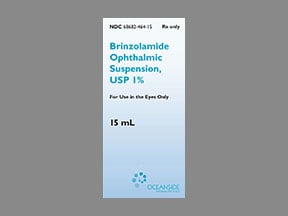
Brinzolamide Coupons & Savings Card – Discount Prices from $56.42
Generic for: Azopt
My prescription
Edit
10ML of 1%, Brinzolamide (1 Bottle)
Select pharmacy

CVS
$56.42
COUPON PRICE
Walgreens
$103.70
COUPON PRICE
Albertsons
$131.81
COUPON PRICE
Walmart
$157.35
COUPON PRICEBrinzolamide savings card
Show this card to your pharmacist
CVS
$56.42
BIN
ID
PCN
GRP
019876
LH97BCEBDB
CHIPPO
LHX
Powered by
More prescriptions for glaucoma
More prescriptions for glaucoma
Price history for Azopt (brand) & Brinzolamide (generic)
1 Bottle, 10ML
Average retail price for Azopt
Average retail price for Brinzolamide
Average SaveHealth price for Brinzolamide
Our price history data is based on aggregated prescription data collected from participating pharmacies in America. Our prescription data updates daily to reflect the latest price changes. If you notice a missing data point, it means there wasn't sufficient data available to generate a monetary value for that date.
We analyzed Brinzolamide prices for (10ML, 1 Bottle) over the last 12 months. The average retail price was $424.16, while the average price using the SaveHealth discount card was $178.90. That's a savings of approximately 57.82% when using our Brinzolamide coupon.
Compared to the generic version, Azopt had an average price of $439.87 over the same time period. With the SaveHealth savings card, Brinzolamide is 59.33% cheaper on average than Azopt.
*Retail prices are based on pharmacy claims data, and may not be accurate when we don't have enough claims.
Brinzolamide dosage forms
Dosage Quantity Price from Per unit 10ML 1 Bottle $56.42 $56.42 10ML 2 Bottles $102.54 $51.27 10ML 3 Bottles $140.66 $46.89
| Dosage | Quantity | Price from | Per unit |
|---|---|---|---|
| 10ML | 1 Bottle | $56.42 | $56.42 |
| 10ML | 2 Bottles | $102.54 | $51.27 |
| 10ML | 3 Bottles | $140.66 | $46.89 |
